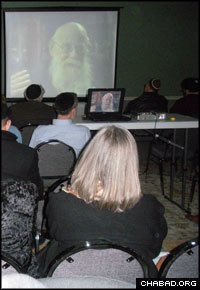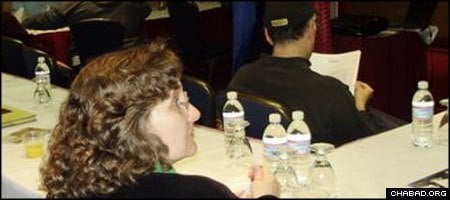Thousands of people from almost 300 Jewish communities around the world joined together for a giant Torah class taught by Rabbi Adin Even Yisrael Steinsaltz, a Chabad-Lubavitch Chasid whom Time magazine once referred to as a “once-in-a-millennium scholar.”
Organized by the Rohr Jewish Learning Institute, the adult education arm of Chabad-Lubavitch, the Jan. 25 lecture – which focused on the power of Torah study as the penultimate expression of the Jewish people’s unity with G‑d – was one of four to be presented in such a format this year.
The New York-based initiative seized on the idea of a worldwide live hookup in honor of hakhel, a once-in-seven-years gathering of the Jewish people that has its roots in the days of the Holy Temple. In his teachings on the subject, the Rebbe, Rabbi Menachem M. Schneerson, of righteous memory, stressed that in modern times, hakhel can be observed by each and every person infusing their communities with a reinvigorated commitment to G‑d and His Torah.
Among the thousands of people who participated in the live class broadcast via the Internet, Cindy Sanders, a music teacher at Da Vinci Academy in Colorado Springs, Colo., said that the Torah class really spoke to her.
“When you learn Torah, the act of learning is an act of worship in and of itself, and brings you closer to G‑d, just like in a parent-child relationship,” she said, paraphrasing some of the rabbi’s talk. “A meaningful bond is created between two people who are doing something together, in this case between man and G‑d.
“It was a most interesting lecture,” she added.
Sanders watched the broadcast from her local Chabad House with more than 40 other people. Many came to the event, said Rabbi Moshe Liberow, because of the reputation of Steinsaltz, an author of more than 50 scholarly works and recipient of the Israel Prize.
“It was a very positive experience for people,” said the rabbi, who directs Chabad-Lubavitch of Southern Colorado. “It was very special to be able to unite with so many others around the globe.”
Pediatrician Dr. David Cotlar agreed.
“I think the opportunity to hear an internationally-recognized Torah scholar is a really special opportunity,” he said after watching the broadcast from Chabad Outreach of Houston, Texas.

Technological Power
According to Rabbi Levi Kaplan, who is in charge of online learning for the Rohr JLI, the lecture dovetailed with the slew of Torah courses that the institute has published and coordinated for the last several years. In each of its courses, the institute focuses on contemporary issues – the latest unit examines business ethics from the standpoint of Jewish law and tradition – emphasizing the universality of Torah and its application in everyday life.
“In the courses, participants and their teachers are able to examine Torah and Jewish life,” he said. Ultimately, the bond every Jewish person shares with another, and with G‑d, becomes more revealed through the experience, he added.
“Others should be inspired to attend events like this one,” echoed Noah Wasserman, a retired engineer who regularly attends programs at the North County Chabad Center in Yorba Linda, Calif.
He added that he was looking forward to the next global lecture, which will be given by British Chief Rabbi Jonathan Sacks on April 5. The date corresponds to the 11th day of the Hebrew month of Nissan, the anniversary of the birth of the Rebbe, Rabbi Menachem M. Schneerson, of righteous memory.
For Rabbi Moshe Kotlarsky, vice chairman of Merkos L’Inyonei Chinuch, the educational arm of Chabad-Lubavitch, the lecture spoke to the ability of technology to be harnessed for holy purposes. The lecture series grew out of an initiative announced at this year’s International Conference of Chabad-Lubavitch Emissaries to bring the spirit of hakhel into new formats and concepts.
The Rohr JLI is “using technology to make this the largest Torah event ever by bringing together hundreds of communities in a virtual” gathering, he said in introducing Steinsaltz. “Though we do not share physical space, we are bound by our shared heritage. Our coming together transcends physical space.”





Join the Discussion